Does Surveillance Law Provide Security or Threaten Privacy?
VerifiedAdded on 2022/05/13
|8
|1935
|23
AI Summary
In Australia, various network media are covered by surveillance laws, including telephone service, internet service, other communication systems, financial services, international travel, and government policies. The increasing use of surveillance technology in society has brought it to the public's attention, with proponents seeing it as a way to improve security while opponents see it as an invasion of privacy.
Contribute Materials
Your contribution can guide someone’s learning journey. Share your
documents today.
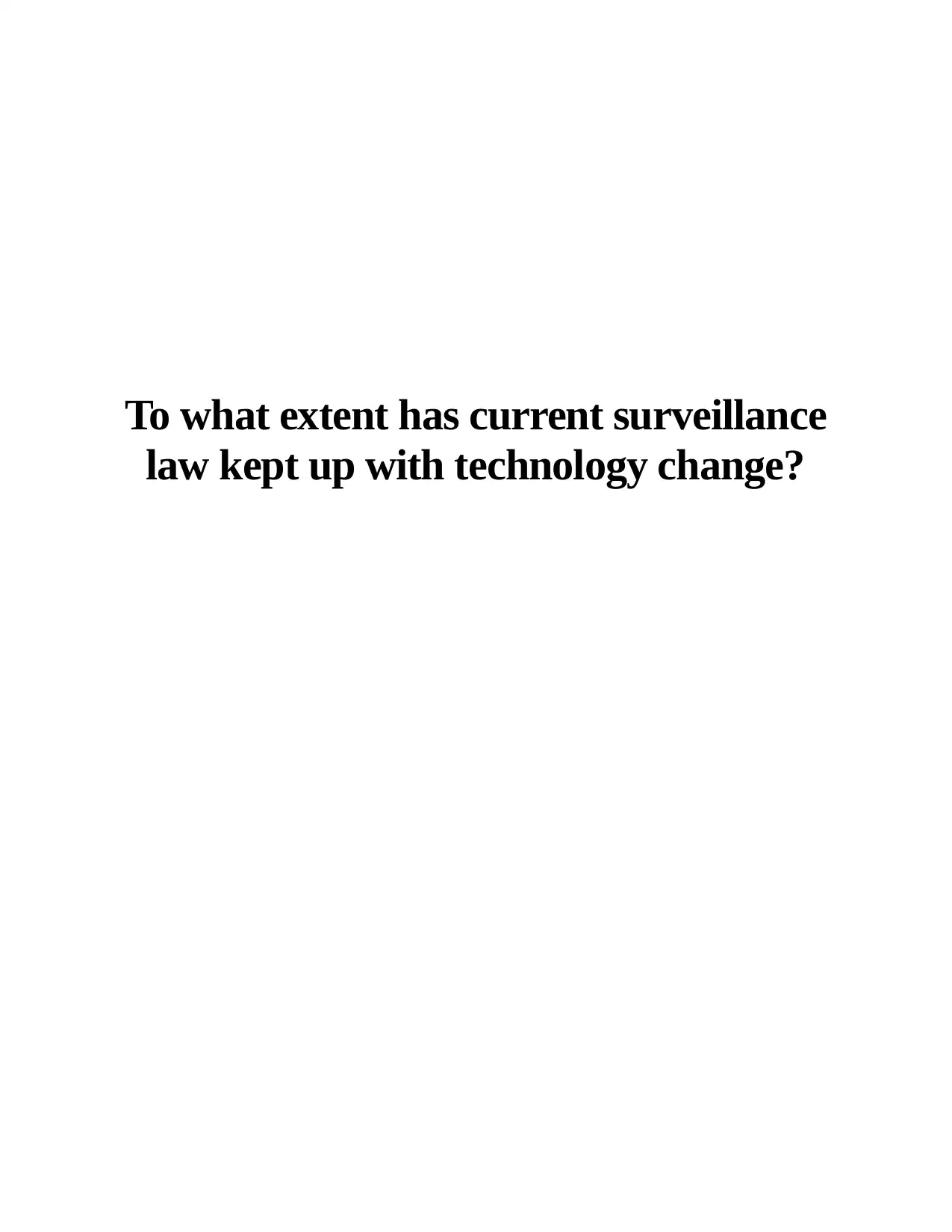
To what extent has current surveillance
law kept up with technology change?
law kept up with technology change?
Secure Best Marks with AI Grader
Need help grading? Try our AI Grader for instant feedback on your assignments.
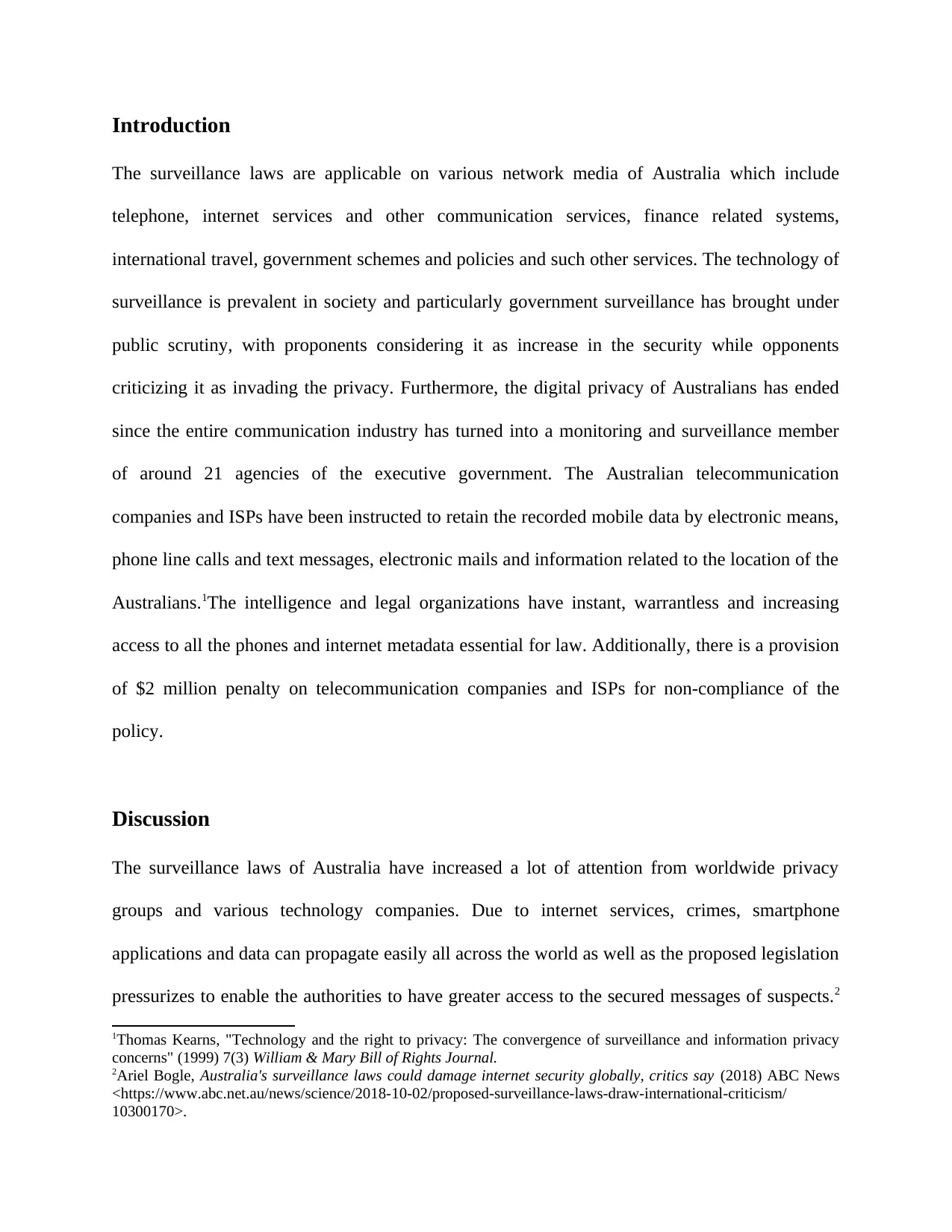
Introduction
The surveillance laws are applicable on various network media of Australia which include
telephone, internet services and other communication services, finance related systems,
international travel, government schemes and policies and such other services. The technology of
surveillance is prevalent in society and particularly government surveillance has brought under
public scrutiny, with proponents considering it as increase in the security while opponents
criticizing it as invading the privacy. Furthermore, the digital privacy of Australians has ended
since the entire communication industry has turned into a monitoring and surveillance member
of around 21 agencies of the executive government. The Australian telecommunication
companies and ISPs have been instructed to retain the recorded mobile data by electronic means,
phone line calls and text messages, electronic mails and information related to the location of the
Australians.1The intelligence and legal organizations have instant, warrantless and increasing
access to all the phones and internet metadata essential for law. Additionally, there is a provision
of $2 million penalty on telecommunication companies and ISPs for non-compliance of the
policy.
Discussion
The surveillance laws of Australia have increased a lot of attention from worldwide privacy
groups and various technology companies. Due to internet services, crimes, smartphone
applications and data can propagate easily all across the world as well as the proposed legislation
pressurizes to enable the authorities to have greater access to the secured messages of suspects.2
1Thomas Kearns, "Technology and the right to privacy: The convergence of surveillance and information privacy
concerns" (1999) 7(3) William & Mary Bill of Rights Journal.
2Ariel Bogle, Australia's surveillance laws could damage internet security globally, critics say (2018) ABC News
<https://www.abc.net.au/news/science/2018-10-02/proposed-surveillance-laws-draw-international-criticism/
10300170>.
The surveillance laws are applicable on various network media of Australia which include
telephone, internet services and other communication services, finance related systems,
international travel, government schemes and policies and such other services. The technology of
surveillance is prevalent in society and particularly government surveillance has brought under
public scrutiny, with proponents considering it as increase in the security while opponents
criticizing it as invading the privacy. Furthermore, the digital privacy of Australians has ended
since the entire communication industry has turned into a monitoring and surveillance member
of around 21 agencies of the executive government. The Australian telecommunication
companies and ISPs have been instructed to retain the recorded mobile data by electronic means,
phone line calls and text messages, electronic mails and information related to the location of the
Australians.1The intelligence and legal organizations have instant, warrantless and increasing
access to all the phones and internet metadata essential for law. Additionally, there is a provision
of $2 million penalty on telecommunication companies and ISPs for non-compliance of the
policy.
Discussion
The surveillance laws of Australia have increased a lot of attention from worldwide privacy
groups and various technology companies. Due to internet services, crimes, smartphone
applications and data can propagate easily all across the world as well as the proposed legislation
pressurizes to enable the authorities to have greater access to the secured messages of suspects.2
1Thomas Kearns, "Technology and the right to privacy: The convergence of surveillance and information privacy
concerns" (1999) 7(3) William & Mary Bill of Rights Journal.
2Ariel Bogle, Australia's surveillance laws could damage internet security globally, critics say (2018) ABC News
<https://www.abc.net.au/news/science/2018-10-02/proposed-surveillance-laws-draw-international-criticism/
10300170>.
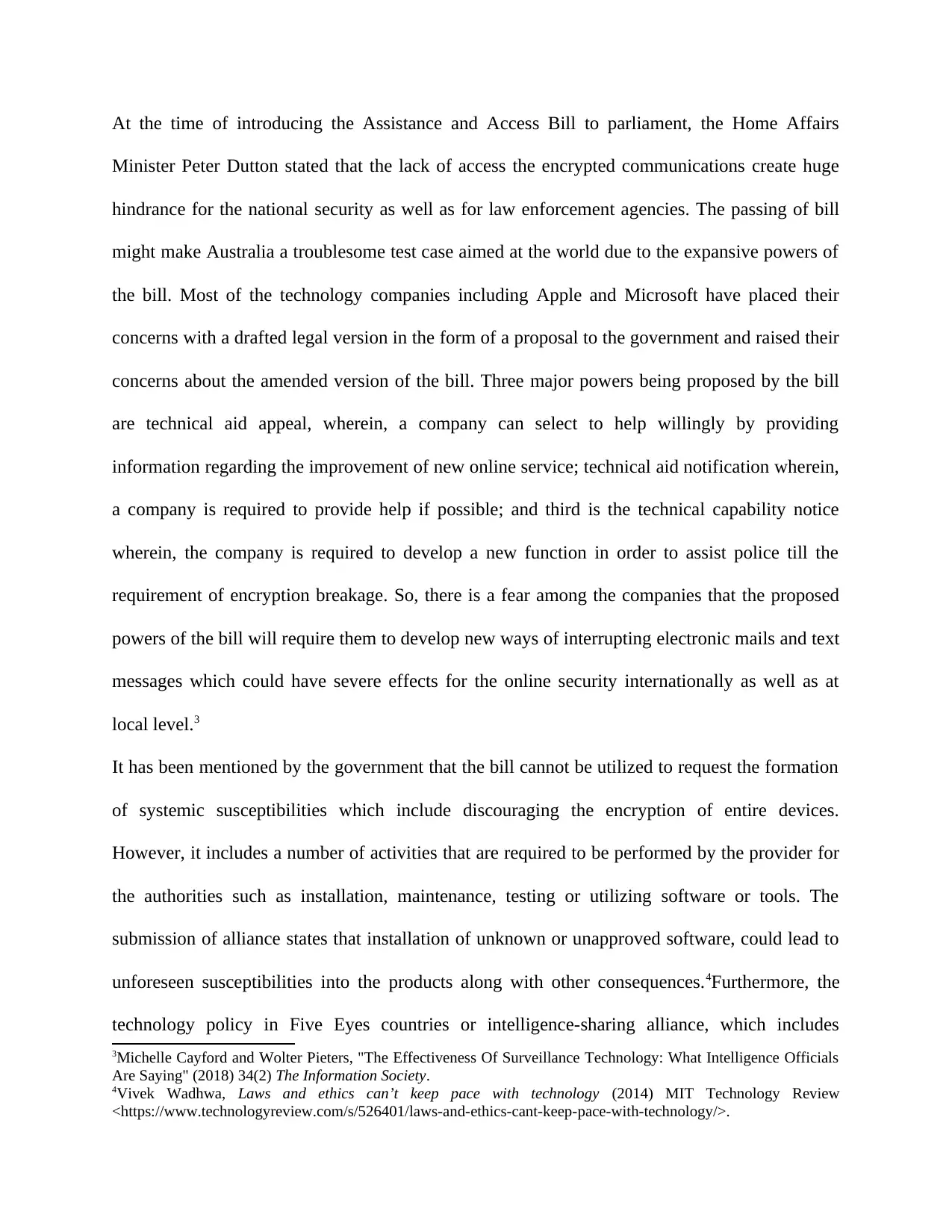
At the time of introducing the Assistance and Access Bill to parliament, the Home Affairs
Minister Peter Dutton stated that the lack of access the encrypted communications create huge
hindrance for the national security as well as for law enforcement agencies. The passing of bill
might make Australia a troublesome test case aimed at the world due to the expansive powers of
the bill. Most of the technology companies including Apple and Microsoft have placed their
concerns with a drafted legal version in the form of a proposal to the government and raised their
concerns about the amended version of the bill. Three major powers being proposed by the bill
are technical aid appeal, wherein, a company can select to help willingly by providing
information regarding the improvement of new online service; technical aid notification wherein,
a company is required to provide help if possible; and third is the technical capability notice
wherein, the company is required to develop a new function in order to assist police till the
requirement of encryption breakage. So, there is a fear among the companies that the proposed
powers of the bill will require them to develop new ways of interrupting electronic mails and text
messages which could have severe effects for the online security internationally as well as at
local level.3
It has been mentioned by the government that the bill cannot be utilized to request the formation
of systemic susceptibilities which include discouraging the encryption of entire devices.
However, it includes a number of activities that are required to be performed by the provider for
the authorities such as installation, maintenance, testing or utilizing software or tools. The
submission of alliance states that installation of unknown or unapproved software, could lead to
unforeseen susceptibilities into the products along with other consequences.4Furthermore, the
technology policy in Five Eyes countries or intelligence-sharing alliance, which includes
3Michelle Cayford and Wolter Pieters, "The Effectiveness Of Surveillance Technology: What Intelligence Officials
Are Saying" (2018) 34(2) The Information Society.
4Vivek Wadhwa, Laws and ethics can’t keep pace with technology (2014) MIT Technology Review
<https://www.technologyreview.com/s/526401/laws-and-ethics-cant-keep-pace-with-technology/>.
Minister Peter Dutton stated that the lack of access the encrypted communications create huge
hindrance for the national security as well as for law enforcement agencies. The passing of bill
might make Australia a troublesome test case aimed at the world due to the expansive powers of
the bill. Most of the technology companies including Apple and Microsoft have placed their
concerns with a drafted legal version in the form of a proposal to the government and raised their
concerns about the amended version of the bill. Three major powers being proposed by the bill
are technical aid appeal, wherein, a company can select to help willingly by providing
information regarding the improvement of new online service; technical aid notification wherein,
a company is required to provide help if possible; and third is the technical capability notice
wherein, the company is required to develop a new function in order to assist police till the
requirement of encryption breakage. So, there is a fear among the companies that the proposed
powers of the bill will require them to develop new ways of interrupting electronic mails and text
messages which could have severe effects for the online security internationally as well as at
local level.3
It has been mentioned by the government that the bill cannot be utilized to request the formation
of systemic susceptibilities which include discouraging the encryption of entire devices.
However, it includes a number of activities that are required to be performed by the provider for
the authorities such as installation, maintenance, testing or utilizing software or tools. The
submission of alliance states that installation of unknown or unapproved software, could lead to
unforeseen susceptibilities into the products along with other consequences.4Furthermore, the
technology policy in Five Eyes countries or intelligence-sharing alliance, which includes
3Michelle Cayford and Wolter Pieters, "The Effectiveness Of Surveillance Technology: What Intelligence Officials
Are Saying" (2018) 34(2) The Information Society.
4Vivek Wadhwa, Laws and ethics can’t keep pace with technology (2014) MIT Technology Review
<https://www.technologyreview.com/s/526401/laws-and-ethics-cant-keep-pace-with-technology/>.
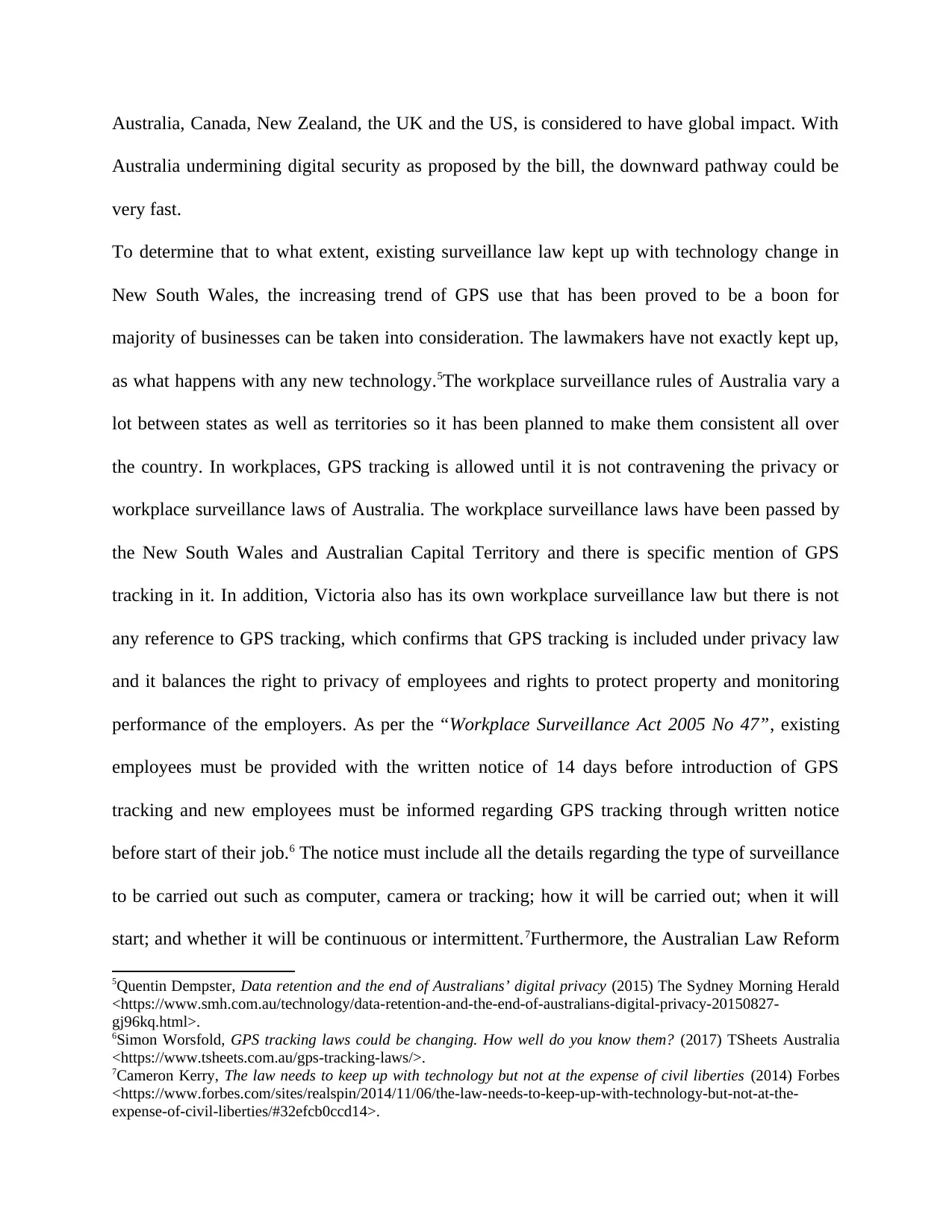
Australia, Canada, New Zealand, the UK and the US, is considered to have global impact. With
Australia undermining digital security as proposed by the bill, the downward pathway could be
very fast.
To determine that to what extent, existing surveillance law kept up with technology change in
New South Wales, the increasing trend of GPS use that has been proved to be a boon for
majority of businesses can be taken into consideration. The lawmakers have not exactly kept up,
as what happens with any new technology.5The workplace surveillance rules of Australia vary a
lot between states as well as territories so it has been planned to make them consistent all over
the country. In workplaces, GPS tracking is allowed until it is not contravening the privacy or
workplace surveillance laws of Australia. The workplace surveillance laws have been passed by
the New South Wales and Australian Capital Territory and there is specific mention of GPS
tracking in it. In addition, Victoria also has its own workplace surveillance law but there is not
any reference to GPS tracking, which confirms that GPS tracking is included under privacy law
and it balances the right to privacy of employees and rights to protect property and monitoring
performance of the employers. As per the “Workplace Surveillance Act 2005 No 47”, existing
employees must be provided with the written notice of 14 days before introduction of GPS
tracking and new employees must be informed regarding GPS tracking through written notice
before start of their job.6 The notice must include all the details regarding the type of surveillance
to be carried out such as computer, camera or tracking; how it will be carried out; when it will
start; and whether it will be continuous or intermittent.7Furthermore, the Australian Law Reform
5Quentin Dempster, Data retention and the end of Australians’ digital privacy (2015) The Sydney Morning Herald
<https://www.smh.com.au/technology/data-retention-and-the-end-of-australians-digital-privacy-20150827-
gj96kq.html>.
6Simon Worsfold, GPS tracking laws could be changing. How well do you know them? (2017) TSheets Australia
<https://www.tsheets.com.au/gps-tracking-laws/>.
7Cameron Kerry, The law needs to keep up with technology but not at the expense of civil liberties (2014) Forbes
<https://www.forbes.com/sites/realspin/2014/11/06/the-law-needs-to-keep-up-with-technology-but-not-at-the-
expense-of-civil-liberties/#32efcb0ccd14>.
Australia undermining digital security as proposed by the bill, the downward pathway could be
very fast.
To determine that to what extent, existing surveillance law kept up with technology change in
New South Wales, the increasing trend of GPS use that has been proved to be a boon for
majority of businesses can be taken into consideration. The lawmakers have not exactly kept up,
as what happens with any new technology.5The workplace surveillance rules of Australia vary a
lot between states as well as territories so it has been planned to make them consistent all over
the country. In workplaces, GPS tracking is allowed until it is not contravening the privacy or
workplace surveillance laws of Australia. The workplace surveillance laws have been passed by
the New South Wales and Australian Capital Territory and there is specific mention of GPS
tracking in it. In addition, Victoria also has its own workplace surveillance law but there is not
any reference to GPS tracking, which confirms that GPS tracking is included under privacy law
and it balances the right to privacy of employees and rights to protect property and monitoring
performance of the employers. As per the “Workplace Surveillance Act 2005 No 47”, existing
employees must be provided with the written notice of 14 days before introduction of GPS
tracking and new employees must be informed regarding GPS tracking through written notice
before start of their job.6 The notice must include all the details regarding the type of surveillance
to be carried out such as computer, camera or tracking; how it will be carried out; when it will
start; and whether it will be continuous or intermittent.7Furthermore, the Australian Law Reform
5Quentin Dempster, Data retention and the end of Australians’ digital privacy (2015) The Sydney Morning Herald
<https://www.smh.com.au/technology/data-retention-and-the-end-of-australians-digital-privacy-20150827-
gj96kq.html>.
6Simon Worsfold, GPS tracking laws could be changing. How well do you know them? (2017) TSheets Australia
<https://www.tsheets.com.au/gps-tracking-laws/>.
7Cameron Kerry, The law needs to keep up with technology but not at the expense of civil liberties (2014) Forbes
<https://www.forbes.com/sites/realspin/2014/11/06/the-law-needs-to-keep-up-with-technology-but-not-at-the-
expense-of-civil-liberties/#32efcb0ccd14>.
Secure Best Marks with AI Grader
Need help grading? Try our AI Grader for instant feedback on your assignments.
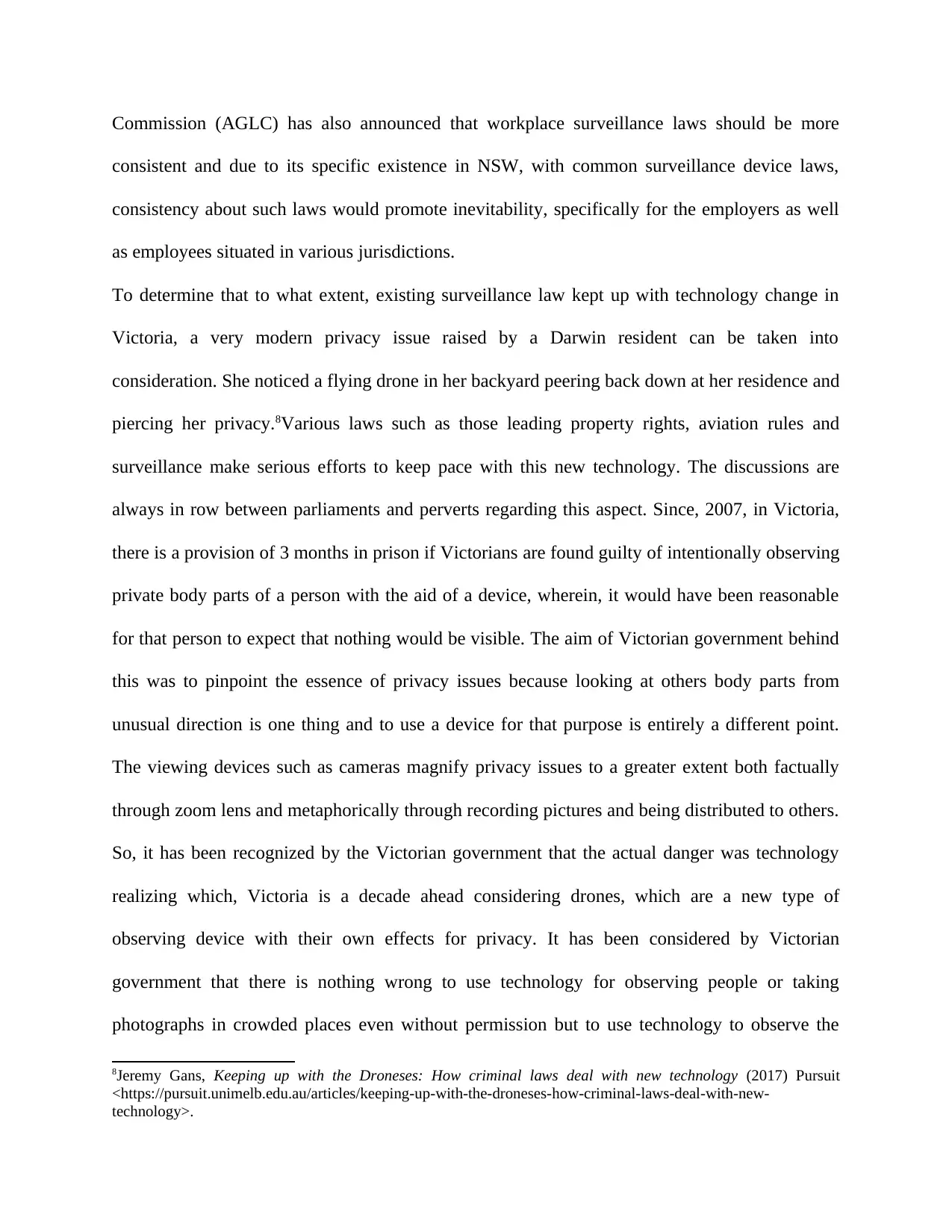
Commission (AGLC) has also announced that workplace surveillance laws should be more
consistent and due to its specific existence in NSW, with common surveillance device laws,
consistency about such laws would promote inevitability, specifically for the employers as well
as employees situated in various jurisdictions.
To determine that to what extent, existing surveillance law kept up with technology change in
Victoria, a very modern privacy issue raised by a Darwin resident can be taken into
consideration. She noticed a flying drone in her backyard peering back down at her residence and
piercing her privacy.8Various laws such as those leading property rights, aviation rules and
surveillance make serious efforts to keep pace with this new technology. The discussions are
always in row between parliaments and perverts regarding this aspect. Since, 2007, in Victoria,
there is a provision of 3 months in prison if Victorians are found guilty of intentionally observing
private body parts of a person with the aid of a device, wherein, it would have been reasonable
for that person to expect that nothing would be visible. The aim of Victorian government behind
this was to pinpoint the essence of privacy issues because looking at others body parts from
unusual direction is one thing and to use a device for that purpose is entirely a different point.
The viewing devices such as cameras magnify privacy issues to a greater extent both factually
through zoom lens and metaphorically through recording pictures and being distributed to others.
So, it has been recognized by the Victorian government that the actual danger was technology
realizing which, Victoria is a decade ahead considering drones, which are a new type of
observing device with their own effects for privacy. It has been considered by Victorian
government that there is nothing wrong to use technology for observing people or taking
photographs in crowded places even without permission but to use technology to observe the
8Jeremy Gans, Keeping up with the Droneses: How criminal laws deal with new technology (2017) Pursuit
<https://pursuit.unimelb.edu.au/articles/keeping-up-with-the-droneses-how-criminal-laws-deal-with-new-
technology>.
consistent and due to its specific existence in NSW, with common surveillance device laws,
consistency about such laws would promote inevitability, specifically for the employers as well
as employees situated in various jurisdictions.
To determine that to what extent, existing surveillance law kept up with technology change in
Victoria, a very modern privacy issue raised by a Darwin resident can be taken into
consideration. She noticed a flying drone in her backyard peering back down at her residence and
piercing her privacy.8Various laws such as those leading property rights, aviation rules and
surveillance make serious efforts to keep pace with this new technology. The discussions are
always in row between parliaments and perverts regarding this aspect. Since, 2007, in Victoria,
there is a provision of 3 months in prison if Victorians are found guilty of intentionally observing
private body parts of a person with the aid of a device, wherein, it would have been reasonable
for that person to expect that nothing would be visible. The aim of Victorian government behind
this was to pinpoint the essence of privacy issues because looking at others body parts from
unusual direction is one thing and to use a device for that purpose is entirely a different point.
The viewing devices such as cameras magnify privacy issues to a greater extent both factually
through zoom lens and metaphorically through recording pictures and being distributed to others.
So, it has been recognized by the Victorian government that the actual danger was technology
realizing which, Victoria is a decade ahead considering drones, which are a new type of
observing device with their own effects for privacy. It has been considered by Victorian
government that there is nothing wrong to use technology for observing people or taking
photographs in crowded places even without permission but to use technology to observe the
8Jeremy Gans, Keeping up with the Droneses: How criminal laws deal with new technology (2017) Pursuit
<https://pursuit.unimelb.edu.au/articles/keeping-up-with-the-droneses-how-criminal-laws-deal-with-new-
technology>.
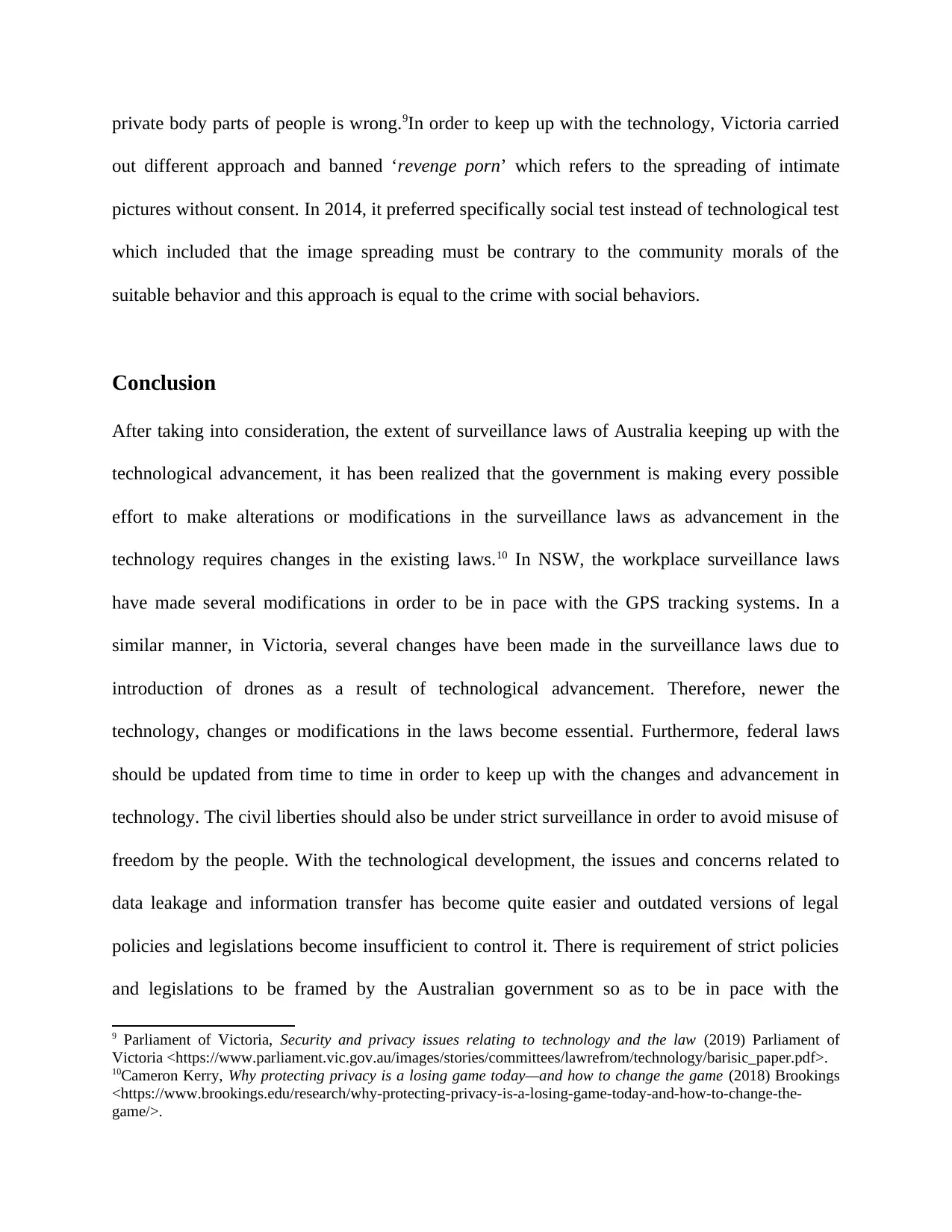
private body parts of people is wrong.9In order to keep up with the technology, Victoria carried
out different approach and banned ‘revenge porn’ which refers to the spreading of intimate
pictures without consent. In 2014, it preferred specifically social test instead of technological test
which included that the image spreading must be contrary to the community morals of the
suitable behavior and this approach is equal to the crime with social behaviors.
Conclusion
After taking into consideration, the extent of surveillance laws of Australia keeping up with the
technological advancement, it has been realized that the government is making every possible
effort to make alterations or modifications in the surveillance laws as advancement in the
technology requires changes in the existing laws.10 In NSW, the workplace surveillance laws
have made several modifications in order to be in pace with the GPS tracking systems. In a
similar manner, in Victoria, several changes have been made in the surveillance laws due to
introduction of drones as a result of technological advancement. Therefore, newer the
technology, changes or modifications in the laws become essential. Furthermore, federal laws
should be updated from time to time in order to keep up with the changes and advancement in
technology. The civil liberties should also be under strict surveillance in order to avoid misuse of
freedom by the people. With the technological development, the issues and concerns related to
data leakage and information transfer has become quite easier and outdated versions of legal
policies and legislations become insufficient to control it. There is requirement of strict policies
and legislations to be framed by the Australian government so as to be in pace with the
9 Parliament of Victoria, Security and privacy issues relating to technology and the law (2019) Parliament of
Victoria <https://www.parliament.vic.gov.au/images/stories/committees/lawrefrom/technology/barisic_paper.pdf>.
10Cameron Kerry, Why protecting privacy is a losing game today—and how to change the game (2018) Brookings
<https://www.brookings.edu/research/why-protecting-privacy-is-a-losing-game-today-and-how-to-change-the-
game/>.
out different approach and banned ‘revenge porn’ which refers to the spreading of intimate
pictures without consent. In 2014, it preferred specifically social test instead of technological test
which included that the image spreading must be contrary to the community morals of the
suitable behavior and this approach is equal to the crime with social behaviors.
Conclusion
After taking into consideration, the extent of surveillance laws of Australia keeping up with the
technological advancement, it has been realized that the government is making every possible
effort to make alterations or modifications in the surveillance laws as advancement in the
technology requires changes in the existing laws.10 In NSW, the workplace surveillance laws
have made several modifications in order to be in pace with the GPS tracking systems. In a
similar manner, in Victoria, several changes have been made in the surveillance laws due to
introduction of drones as a result of technological advancement. Therefore, newer the
technology, changes or modifications in the laws become essential. Furthermore, federal laws
should be updated from time to time in order to keep up with the changes and advancement in
technology. The civil liberties should also be under strict surveillance in order to avoid misuse of
freedom by the people. With the technological development, the issues and concerns related to
data leakage and information transfer has become quite easier and outdated versions of legal
policies and legislations become insufficient to control it. There is requirement of strict policies
and legislations to be framed by the Australian government so as to be in pace with the
9 Parliament of Victoria, Security and privacy issues relating to technology and the law (2019) Parliament of
Victoria <https://www.parliament.vic.gov.au/images/stories/committees/lawrefrom/technology/barisic_paper.pdf>.
10Cameron Kerry, Why protecting privacy is a losing game today—and how to change the game (2018) Brookings
<https://www.brookings.edu/research/why-protecting-privacy-is-a-losing-game-today-and-how-to-change-the-
game/>.
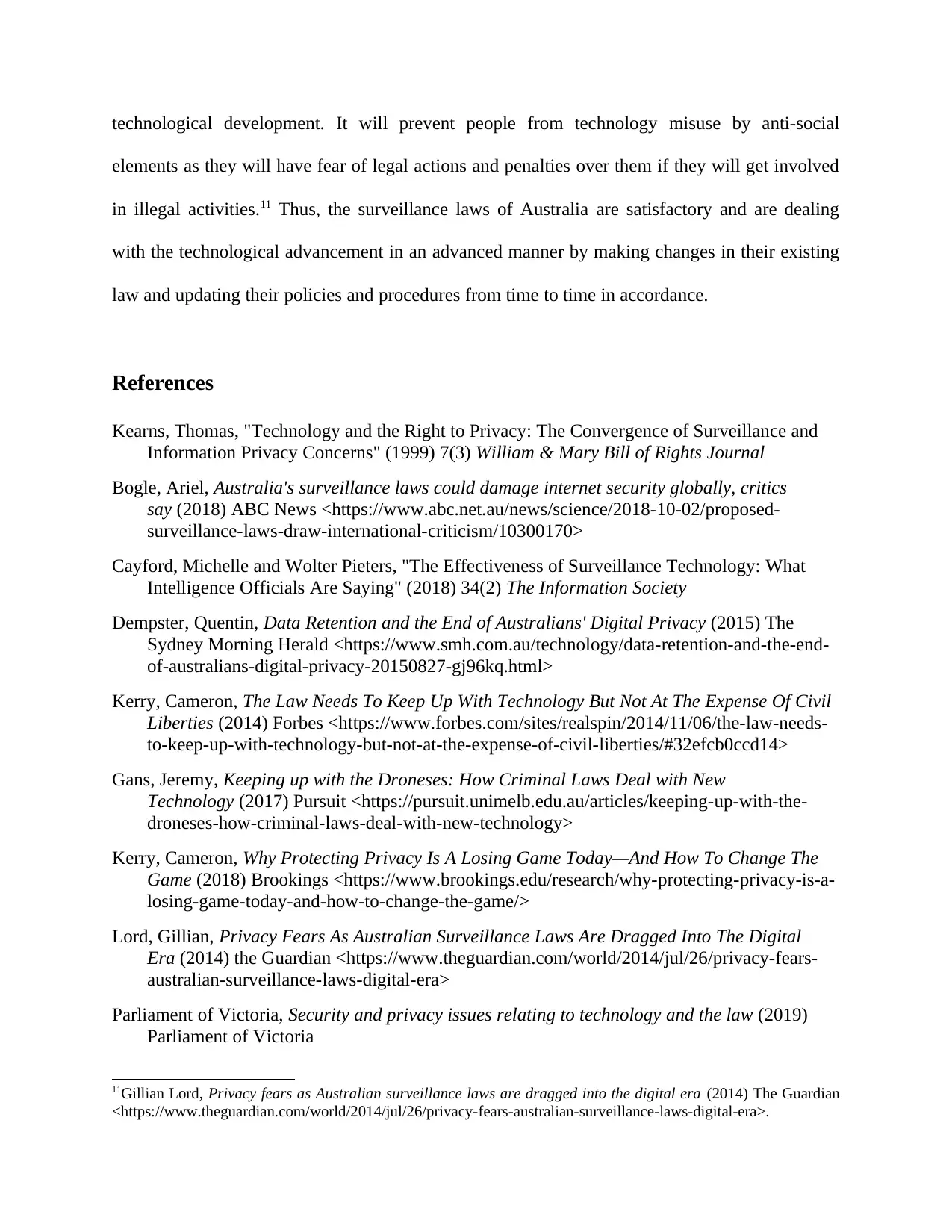
technological development. It will prevent people from technology misuse by anti-social
elements as they will have fear of legal actions and penalties over them if they will get involved
in illegal activities.11 Thus, the surveillance laws of Australia are satisfactory and are dealing
with the technological advancement in an advanced manner by making changes in their existing
law and updating their policies and procedures from time to time in accordance.
References
Kearns, Thomas, "Technology and the Right to Privacy: The Convergence of Surveillance and
Information Privacy Concerns" (1999) 7(3) William & Mary Bill of Rights Journal
Bogle, Ariel, Australia's surveillance laws could damage internet security globally, critics
say (2018) ABC News <https://www.abc.net.au/news/science/2018-10-02/proposed-
surveillance-laws-draw-international-criticism/10300170>
Cayford, Michelle and Wolter Pieters, "The Effectiveness of Surveillance Technology: What
Intelligence Officials Are Saying" (2018) 34(2) The Information Society
Dempster, Quentin, Data Retention and the End of Australians' Digital Privacy (2015) The
Sydney Morning Herald <https://www.smh.com.au/technology/data-retention-and-the-end-
of-australians-digital-privacy-20150827-gj96kq.html>
Kerry, Cameron, The Law Needs To Keep Up With Technology But Not At The Expense Of Civil
Liberties (2014) Forbes <https://www.forbes.com/sites/realspin/2014/11/06/the-law-needs-
to-keep-up-with-technology-but-not-at-the-expense-of-civil-liberties/#32efcb0ccd14>
Gans, Jeremy, Keeping up with the Droneses: How Criminal Laws Deal with New
Technology (2017) Pursuit <https://pursuit.unimelb.edu.au/articles/keeping-up-with-the-
droneses-how-criminal-laws-deal-with-new-technology>
Kerry, Cameron, Why Protecting Privacy Is A Losing Game Today—And How To Change The
Game (2018) Brookings <https://www.brookings.edu/research/why-protecting-privacy-is-a-
losing-game-today-and-how-to-change-the-game/>
Lord, Gillian, Privacy Fears As Australian Surveillance Laws Are Dragged Into The Digital
Era (2014) the Guardian <https://www.theguardian.com/world/2014/jul/26/privacy-fears-
australian-surveillance-laws-digital-era>
Parliament of Victoria, Security and privacy issues relating to technology and the law (2019)
Parliament of Victoria
11Gillian Lord, Privacy fears as Australian surveillance laws are dragged into the digital era (2014) The Guardian
<https://www.theguardian.com/world/2014/jul/26/privacy-fears-australian-surveillance-laws-digital-era>.
elements as they will have fear of legal actions and penalties over them if they will get involved
in illegal activities.11 Thus, the surveillance laws of Australia are satisfactory and are dealing
with the technological advancement in an advanced manner by making changes in their existing
law and updating their policies and procedures from time to time in accordance.
References
Kearns, Thomas, "Technology and the Right to Privacy: The Convergence of Surveillance and
Information Privacy Concerns" (1999) 7(3) William & Mary Bill of Rights Journal
Bogle, Ariel, Australia's surveillance laws could damage internet security globally, critics
say (2018) ABC News <https://www.abc.net.au/news/science/2018-10-02/proposed-
surveillance-laws-draw-international-criticism/10300170>
Cayford, Michelle and Wolter Pieters, "The Effectiveness of Surveillance Technology: What
Intelligence Officials Are Saying" (2018) 34(2) The Information Society
Dempster, Quentin, Data Retention and the End of Australians' Digital Privacy (2015) The
Sydney Morning Herald <https://www.smh.com.au/technology/data-retention-and-the-end-
of-australians-digital-privacy-20150827-gj96kq.html>
Kerry, Cameron, The Law Needs To Keep Up With Technology But Not At The Expense Of Civil
Liberties (2014) Forbes <https://www.forbes.com/sites/realspin/2014/11/06/the-law-needs-
to-keep-up-with-technology-but-not-at-the-expense-of-civil-liberties/#32efcb0ccd14>
Gans, Jeremy, Keeping up with the Droneses: How Criminal Laws Deal with New
Technology (2017) Pursuit <https://pursuit.unimelb.edu.au/articles/keeping-up-with-the-
droneses-how-criminal-laws-deal-with-new-technology>
Kerry, Cameron, Why Protecting Privacy Is A Losing Game Today—And How To Change The
Game (2018) Brookings <https://www.brookings.edu/research/why-protecting-privacy-is-a-
losing-game-today-and-how-to-change-the-game/>
Lord, Gillian, Privacy Fears As Australian Surveillance Laws Are Dragged Into The Digital
Era (2014) the Guardian <https://www.theguardian.com/world/2014/jul/26/privacy-fears-
australian-surveillance-laws-digital-era>
Parliament of Victoria, Security and privacy issues relating to technology and the law (2019)
Parliament of Victoria
11Gillian Lord, Privacy fears as Australian surveillance laws are dragged into the digital era (2014) The Guardian
<https://www.theguardian.com/world/2014/jul/26/privacy-fears-australian-surveillance-laws-digital-era>.
Paraphrase This Document
Need a fresh take? Get an instant paraphrase of this document with our AI Paraphraser
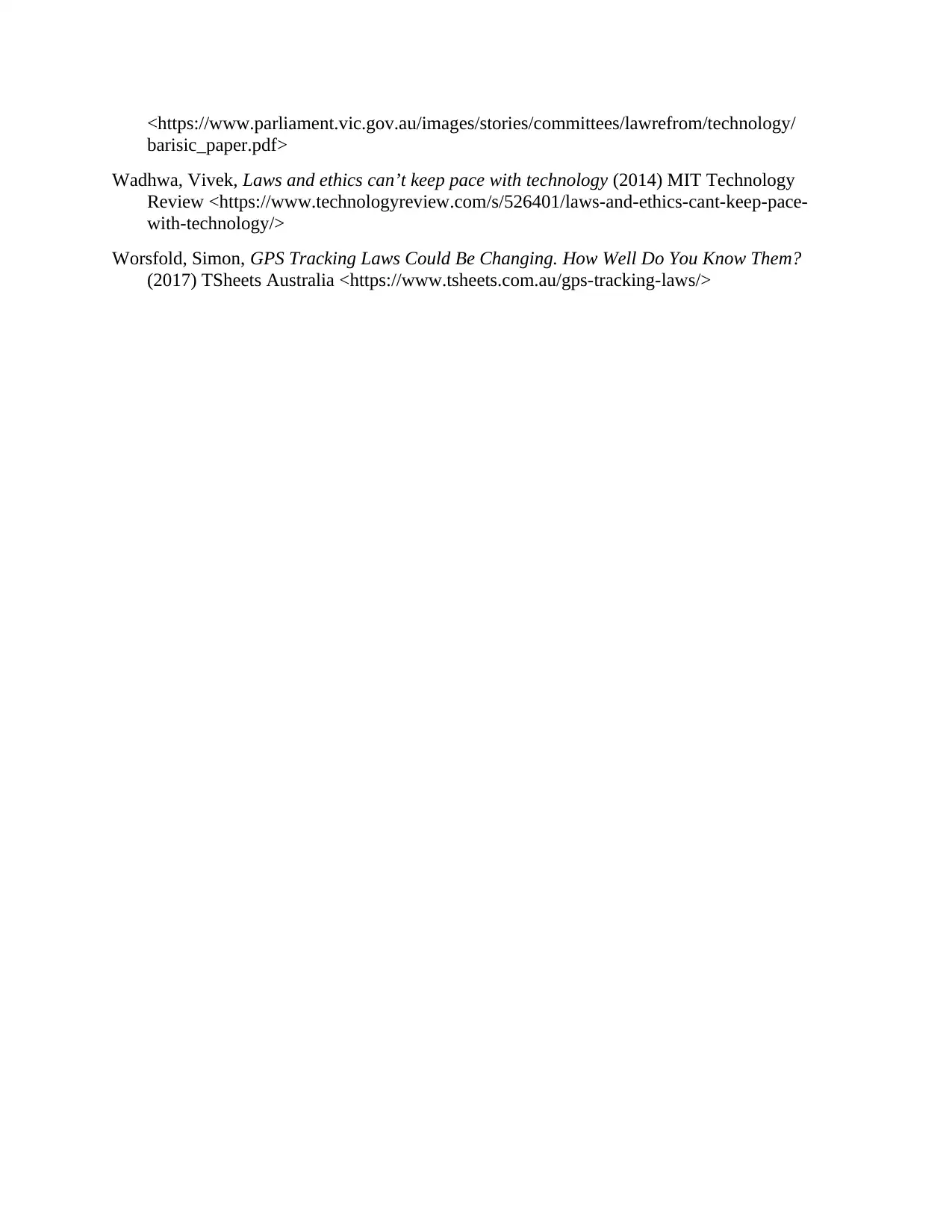
<https://www.parliament.vic.gov.au/images/stories/committees/lawrefrom/technology/
barisic_paper.pdf>
Wadhwa, Vivek, Laws and ethics can’t keep pace with technology (2014) MIT Technology
Review <https://www.technologyreview.com/s/526401/laws-and-ethics-cant-keep-pace-
with-technology/>
Worsfold, Simon, GPS Tracking Laws Could Be Changing. How Well Do You Know Them?
(2017) TSheets Australia <https://www.tsheets.com.au/gps-tracking-laws/>
barisic_paper.pdf>
Wadhwa, Vivek, Laws and ethics can’t keep pace with technology (2014) MIT Technology
Review <https://www.technologyreview.com/s/526401/laws-and-ethics-cant-keep-pace-
with-technology/>
Worsfold, Simon, GPS Tracking Laws Could Be Changing. How Well Do You Know Them?
(2017) TSheets Australia <https://www.tsheets.com.au/gps-tracking-laws/>
1 out of 8
Related Documents
Your All-in-One AI-Powered Toolkit for Academic Success.
+13062052269
info@desklib.com
Available 24*7 on WhatsApp / Email
![[object Object]](/_next/static/media/star-bottom.7253800d.svg)
Unlock your academic potential
© 2024 | Zucol Services PVT LTD | All rights reserved.




